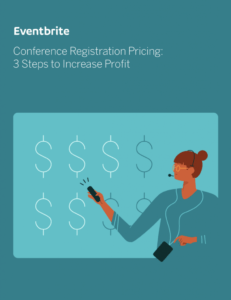“Focus on being productive instead of busy”. This is the advice given by productivity guru and author of the “4 Hour Work Week”, Tim Ferriss. While it’s unlikely that you’ll be planning a conference in just 4 hours a week, what this means is that you should focus on work that helps you get closer to reaching your goal or achieving important milestones, rather than trying to work on too many things at once.
When planning a conference, this can be easier said than done. Conference events have a lot of moving parts and it’s easy to get snowed under by the multitude of tasks in the lead up to your event. To help solve the problem of time management and knowing what jobs to focus on, and when, we created this essential conference planning timeline.
Don’t miss: The Guide to Creating an Out of This World Conference
Getting started: 8-12 months out
Conference planning takes time — the bigger the event, the more time you’ll need. Ideally, you should begin at least 8-12 months prior to your big event, giving you time to lay the foundation for success.
Conference Timeline Task #1: Establish your goals and objectives
- What is your event’s purpose?
- How many people do you want to attend in person? Do you also want people to watch a live stream?
- If your event must turn a profit, how much do you want to make?
- How much will tickets cost?
- Where will your event take place?
Read More: Your Value-Based Pricing Strategy: How to Price Your Event
Conference Timeline Task #2: Put together a rough budget
- Borrow similar figures from past events for a baseline
- Fill in the holes with educated guesses and review regularly to avoid blowouts
Read More: Download the Event Budget Template That Pays Off
Conference Timeline Task #3: Choose a format and theme
- Brainstorm formats that will fit your goals — will your conference have seminars, break-out workshop sessions, a tradeshow?
- Outline of who’s attending your event and select a theme that resonates with your audience
Conference Timeline Task #4: Choose a location, a venue, and vendors
- What geographic area is best for your event?
- How many people will be attending your event?
- Do you need to provide Wifi?
- Does the venue have the infrastructure you need?
- Are there local vendors you can rely on?
Conference Timeline Task #5: Select a date
- Choose an optimal date and a second best for backup when getting sign-off
Conference Timeline Task #6: Research speakers
- Research speakers who have spoken at similar events to yours
- Compile a list of your ideal speakers
- Determine your value proposition to potential speakers before reaching out
- Contact your ideal speakers and invite them
Read More: Strategies for Identifying, Finding, and Securing Conference Speakers
Conference Timeline Task #7: Start your sponsor search
- Determine what kind of activations you can offer
- Look at similar events to yours and see who sponsored them
- Compile a list of your ideal sponsors
- Segment attendees to understand their value to sponsors
- Determine the market rate of your sponsorship packages
Read More: How to Win Sponsors for Your Event (and Bring Them Back Every Year)
Getting granular: 4-8 months out
With the foundation built, the next phase in your planning process puts the final touches on your conference before registrations open.
Conference Timeline Task #8: Finalise speakers
- Balance your agenda to keep attendees engaged
- Sign your speakers and panelists
- Get bio information and photos
- Arrange travel and accommodation
Your speaker lineup can give you a competitive advantage. Using the advice in this checklist, you can find speakers and panelists who can strengthen your brand and grow attendance.
Conference Timeline Task #9: Organise your financials
- Choose your ticketing or registration technology
- Finalise sponsors and their contributions
- Set your ticket prices (VIP, early bird, and launch sales)
Read More: Conference Registration Pricing: 3 Steps to Increase Profit
Conference Timeline Task #10: Build your branded website
- Craft copy and images that faithfully communicate the attendee experience
- Update your site (if recurring event) or build your new event’s site
- Make sure your website infrastructure can handle the increased traffic during peak times
- Make sure your website is mobile-optimised
Read More: Creating an Event Website That Will Sell Out Your Event
Conference Timeline Task #11: Begin to promote your event
- Develop a messaging doc aligned with your event brand
- Spark early interest with email and social media
- Reach new event-goers with paid advertising and event distribution
- Distribute your event on online event calendars
- Write blog posts about your event
- Create a promo video
Conference Timeline Task #12: Finalise venue details
- Work with the caterer on approving the menu
- Secure A/V equipment and Wifi
- Review security needs and plans with your team
- Make sure you have special permits, licenses, and insurance
- Determine event signage and attendee communication plan
Conference Timeline Task #13: Draft a schedule
- Put together a working draft of your event’s schedule
Finalising details: 2-3 months out
Months before the big event, you have an opportunity to build excitement and — if you haven’t sold out yet — urge interested attendees to register before it’s too late.
Conference Timeline Task #14: Send reminders
- Engage attendees on email and social media
- Reach out to speakers, panelists, and sponsors to make sure they’re taken care of
- Contact vendors to confirm their commitments
Conference Timeline Task #15: Push promotions to meet your attendance goals
- Rekindle interest with retargeting
- Encourage last-minute buyers to register on email and social media
The week before your conference
Your event is a week away, but there are still a few important details that need your close attention.
Conference Timeline Task #16: Finalise event schedule & scripts
- Confirm timeline and guidelines for vendors with the venue
- Make sure everyone has the same schedule
- Get sign off on any speech scripts and copies of any presentation files
Conference Timeline Task #17: Communicate final details with your partners
- Update the caterer and venue with final registration numbers
- Confirm your schedule with vendors, including when to arrive and set up
- Double check the A/V equipment and WiFi (and presentation files to avoid mishaps on the day)
After the conference
Your conference is over, your attendees have everything fresh in their mind and are back in the office telling their friends and coworkers all about it. Now is the time to ‘strike while the iron is hot’. In the weeks following your conference event, you should be finding out what attendees enjoyed, what they didn’t, and if you’re really prepared — enticing them to come back next year.
Conference Timeline Task #18: Survey your audience
- Send surveys to your attendees and ask for feedback
- Send surveys to vendors and staff to measure success
- Collate feedback to use for planning
Conference Timeline Task #19: Prepare content for distribution
- Prepare video content, keynote speeches, and blog posts for distribution
- Send useful content to attendees via email to keep engagement after the event
Conference Timeline Task #20 (Bonus task for the extra prepared!): Launch early-bird VIP sale
- Capitalise on a successful event and attendee buzz by offering a super early-bird special to attendees and their guests to come back next year
Read More: How to Master Early Ticket Sales To Sell Out Quicker
Conference registration, reimagined
Organisations like TedX, Victoria State Government, Panalitix, Clean Energy and more, rely on Eventbrite to power ticketing and registration for conferences of all sizes. Click here to find out how you can grow your conference events with Eventbrite.




